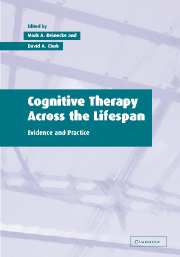Book contents
- Frontmatter
- Contents
- List of contributors
- Foreword
- 1 Cognitive therapy across the lifespan: conceptual horizons
- 2 Cognitive theory and therapy of depression
- 3 Cognitive theory and therapy of bipolar disorders
- 4 Regulation of emotion in generalized anxiety disorder
- 5 Cognitive theory and therapy of obsessions and compulsions
- 6 The cognitive model of panic
- 7 Treating obsessional problems using cognitive-behavioral therapy
- 8 Narcissistic personality disorder
- 9 Cognitive therapy and the self
- 10 Promoting cognitive change in posttraumatic stress disorder
- 11 Cognitive theory and therapy of social phobia
- 12 The cognitive model of bulimia nervosa
- 13 Cognitive therapy and schizophrenia
- 14 Cognitive-behavioral interventions for alcohol abuse and dependence
- 15 Cognitive approaches to understanding, preventing and treating child and adolescent depression
- 16 Cognitive-behavioral interventions in childhood anxiety disorders
- 17 Attention deficit/hyperactivity disorder
- 18 Cognitive-behavioral interventions for children with conduct problems
- 19 Processes of change in cognitive therapy
- 20 Cognitive therapy in the twenty-first century: current status and future directions
- Index
18 - Cognitive-behavioral interventions for children with conduct problems
Published online by Cambridge University Press: 05 July 2014
- Frontmatter
- Contents
- List of contributors
- Foreword
- 1 Cognitive therapy across the lifespan: conceptual horizons
- 2 Cognitive theory and therapy of depression
- 3 Cognitive theory and therapy of bipolar disorders
- 4 Regulation of emotion in generalized anxiety disorder
- 5 Cognitive theory and therapy of obsessions and compulsions
- 6 The cognitive model of panic
- 7 Treating obsessional problems using cognitive-behavioral therapy
- 8 Narcissistic personality disorder
- 9 Cognitive therapy and the self
- 10 Promoting cognitive change in posttraumatic stress disorder
- 11 Cognitive theory and therapy of social phobia
- 12 The cognitive model of bulimia nervosa
- 13 Cognitive therapy and schizophrenia
- 14 Cognitive-behavioral interventions for alcohol abuse and dependence
- 15 Cognitive approaches to understanding, preventing and treating child and adolescent depression
- 16 Cognitive-behavioral interventions in childhood anxiety disorders
- 17 Attention deficit/hyperactivity disorder
- 18 Cognitive-behavioral interventions for children with conduct problems
- 19 Processes of change in cognitive therapy
- 20 Cognitive therapy in the twenty-first century: current status and future directions
- Index
Summary
In this chapter we will provide an overview of cognitive-behavioral therapy for children with symptoms of conduct disorder (CD) and oppositional defiant disorder (ODD). After examining the characteristics of children with these aggressive, disruptive behaviors, the chapter will present a history of cognitive-behavioral therapy with conduct problem children, and then will present a contemporary model of social-cognitive processing difficulties among aggressive children. An intervention model that is derived from this conceptual model, and which served as the basis for an Anger Coping Program and a Coping Power Program, will then be described. Outcome research which has examined the efficacy of several forms of cognitive behavioral interventions for conduct problem children will be reviewed, and the chapter will end with a discussion of the clinical and research implications of the intervention research in this area.
Conduct disorder and oppositional defiant disorder
CD, aggression, and delinquency, are all terms that refer to antisocial behaviors that indicate an inability or failure of an individual to conform to his or her societal norms, authority figures, or to respect the rights of others (Frick, 1998a; Lochman, in press a). These behaviors can range from chronic annoying of others and argumentativeness with adults to stealing, vandalism, and physical harm to others. While these behaviors cover a broad spectrum of problems, they are highly correlated, with few children showing one type of behavior in the absence of others (Frick et al., 1993).
- Type
- Chapter
- Information
- Cognitive Therapy across the LifespanEvidence and Practice, pp. 441 - 476Publisher: Cambridge University PressPrint publication year: 2003
- 4
- Cited by



